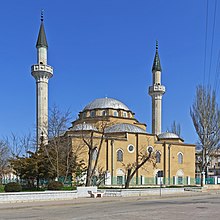| Juma-Jami Mosque | |
|---|---|
 | |
| Religion | |
| Affiliation | Islam |
| Rite | Sunni |
| Status | Active |
| Location | |
| Location | Yevpatoria |
| Territory |
|
| Geographic coordinates | 45°11′45″N 33°22′38″E / 45.19583°N 33.37722°E |
| Architecture | |
| Architect(s) | Mimar Sinan |
| Type | Mosque |
| Style | Ottoman architecture |
| Completed | 1564 |
| Specifications | |
| Direction of façade | North |
| Dome height (outer) | 20 meters |
| Dome dia. (outer) | 6 m (20 ft) |
| Minaret(s) | 2 |
| Minaret height | 35 meters |
| Materials | Limestone |
The Juma-Jami Mosque, ( Ukrainian: Мечеть Джума-Джамі, Crimean Tatar: Cuma Cami, Russian: Мечеть Джума-Джами, Turkish: Cuma Han Camii) also known as the Friday Mosque, is located in Yevpatoria, Crimea. [1] Built between 1552 and 1564, and designed by the Ottoman architect Mimar Sinan.
History
The Juma-Jami is the largest mosque of Crimea and was founded by Khan Devlet I Giray in 1552. The Khan commissioned Istanbul architect Mimar Sinan (1489–1588) to build the mosque. [2] Sinan was the chief architect of the Ottoman Empire. He designed the Sinan Pasha Mosque and the Şehzade Mosque in Istanbul. Construction of the Juma-Jami Mosque was a long process. At the time, Mimar Sinan was busy with construction of the Süleymaniye Mosque, in Istanbul, which was also plagued by financial difficulties due to money being spent on a war with Ivan the Terrible.
The mosque continued to be embellished and improved over time. From 1740 to 1743, the mosque was rebuilt and the main building was restored; from 1758 to 1769, the western facade of the mosque was decorated with paintings. [3]
Photos
-
Main entrance to the Juma-Jami Mosque
See also
References
- ^ "Yevpatoria : The Juma-Jami Mosque". discover-ukraine.info. Retrieved 2023-03-17.
- ^ Pleshakov, Konstantin (2017-01-01). The Crimean Nexus: Putin's War and the Clash of Civilizations. Yale University Press. p. 72. ISBN 978-0-300-21488-8.
- ^ Sementsov, Sergey; Leontyev, Alexander; Huerta, Santiago; Nava, Ignacio Menéndez Pidal de (2020-09-24). Reconstruction and Restoration of Architectural Heritage. CRC Press. p. 77. ISBN 978-1-000-32978-0.
External links
- Han Camii, Archnet
- Mimar Sinan buildings
- Mosques in Crimea
- History of Yevpatoria
- Religious buildings and structures completed in 1564
- 16th-century mosques
- Ottoman mosques
- 16th-century establishments in the Crimean Khanate
- 1564 establishments in Europe
- Cultural heritage monuments of federal significance in Crimea
- Crimea stubs
- European mosque stubs
| Juma-Jami Mosque | |
|---|---|
 | |
| Religion | |
| Affiliation | Islam |
| Rite | Sunni |
| Status | Active |
| Location | |
| Location | Yevpatoria |
| Territory |
|
| Geographic coordinates | 45°11′45″N 33°22′38″E / 45.19583°N 33.37722°E |
| Architecture | |
| Architect(s) | Mimar Sinan |
| Type | Mosque |
| Style | Ottoman architecture |
| Completed | 1564 |
| Specifications | |
| Direction of façade | North |
| Dome height (outer) | 20 meters |
| Dome dia. (outer) | 6 m (20 ft) |
| Minaret(s) | 2 |
| Minaret height | 35 meters |
| Materials | Limestone |
The Juma-Jami Mosque, ( Ukrainian: Мечеть Джума-Джамі, Crimean Tatar: Cuma Cami, Russian: Мечеть Джума-Джами, Turkish: Cuma Han Camii) also known as the Friday Mosque, is located in Yevpatoria, Crimea. [1] Built between 1552 and 1564, and designed by the Ottoman architect Mimar Sinan.
History
The Juma-Jami is the largest mosque of Crimea and was founded by Khan Devlet I Giray in 1552. The Khan commissioned Istanbul architect Mimar Sinan (1489–1588) to build the mosque. [2] Sinan was the chief architect of the Ottoman Empire. He designed the Sinan Pasha Mosque and the Şehzade Mosque in Istanbul. Construction of the Juma-Jami Mosque was a long process. At the time, Mimar Sinan was busy with construction of the Süleymaniye Mosque, in Istanbul, which was also plagued by financial difficulties due to money being spent on a war with Ivan the Terrible.
The mosque continued to be embellished and improved over time. From 1740 to 1743, the mosque was rebuilt and the main building was restored; from 1758 to 1769, the western facade of the mosque was decorated with paintings. [3]
Photos
-
Main entrance to the Juma-Jami Mosque
See also
References
- ^ "Yevpatoria : The Juma-Jami Mosque". discover-ukraine.info. Retrieved 2023-03-17.
- ^ Pleshakov, Konstantin (2017-01-01). The Crimean Nexus: Putin's War and the Clash of Civilizations. Yale University Press. p. 72. ISBN 978-0-300-21488-8.
- ^ Sementsov, Sergey; Leontyev, Alexander; Huerta, Santiago; Nava, Ignacio Menéndez Pidal de (2020-09-24). Reconstruction and Restoration of Architectural Heritage. CRC Press. p. 77. ISBN 978-1-000-32978-0.
External links
- Han Camii, Archnet
- Mimar Sinan buildings
- Mosques in Crimea
- History of Yevpatoria
- Religious buildings and structures completed in 1564
- 16th-century mosques
- Ottoman mosques
- 16th-century establishments in the Crimean Khanate
- 1564 establishments in Europe
- Cultural heritage monuments of federal significance in Crimea
- Crimea stubs
- European mosque stubs







